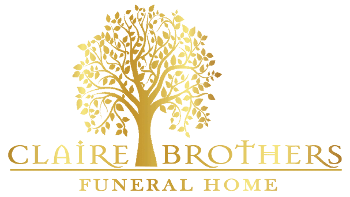
What Paperwork is Needed After Someone Passes Away?
Losing a loved one is a deeply emotional experience, and amidst the grieving process, you may find yourself overwhelmed with paperwork. Understanding what paperwork is needed after someone passes away can help ease some of this stress. From securing death certificates to notifying government agencies, knowing which documents are necessary ensures that the deceased’s legal and financial matters are properly handled, allowing you to focus on healing during this difficult time.
At Claire Brothers Funeral Home, we understand how challenging it can be to manage these tasks. This guide will walk you through the essential paperwork needed after a loved one’s passing, helping you take care of these important responsibilities with clarity and confidence.
Why Paperwork is Necessary After a Death
When someone passes away, certain legal and financial processes need to be completed to close their estate and ensure that any benefits are distributed to the right people. Completing the proper paperwork can help avoid delays, ensure that the deceased’s wishes are honored, and protect their loved ones from unnecessary legal complications.
Essential Paperwork You’ll Need After a Loved One Passes Away
1. The Death Certificate
One of the most critical documents after a death is the death certificate. This official document is needed for many processes, such as claiming life insurance, closing bank accounts, and handling the deceased’s estate.
How to Obtain a Death Certificate:
- Who provides it? A death certificate is usually prepared by the funeral home in collaboration with the local health department. At Claire Brothers Funeral Home, we help families secure certified copies of this document to make the process easier.
- How many copies do you need? It’s recommended to obtain multiple copies (at least 10-15) since various institutions will require a certified copy.
2. Funeral Planning Documents
Before planning a funeral, you’ll need to gather certain documents that pertain to the deceased’s wishes and arrangements. These can include:
- Prepaid funeral plans: If the deceased prepaid for their funeral or burial arrangements, you’ll need the relevant paperwork to honor their plan.
- Will or estate planning documents: These will provide guidance on how the deceased wished their funeral to be handled. It may include preferences for burial, cremation, or other instructions.
At Claire Brothers Funeral Home, we assist families in organizing all aspects of the funeral, ensuring that every step complies with the individual’s final wishes.
3. Will and Testament
If your loved one had a will or trust in place, this document will guide the distribution of their assets. The will also names the executor, the person responsible for managing the deceased’s estate.
Key Steps for the Executor:
- Locate the will: Ideally, the deceased informed a family member or lawyer where the will is stored. A copy may be in a safe, with a lawyer, or stored in a secure digital location.
- Submit the will to probate: Depending on the state laws, the will must be submitted to the probate court to begin the legal process of executing the estate. The court will determine the validity of the will and oversee the distribution of assets.
If there is no will, the estate is considered “intestate,” and state laws will dictate how assets are distributed.
4. Financial Accounts and Insurance Policies
Many financial institutions and insurance companies require specific documents to close accounts or claim benefits. Here’s what you will need:
For Bank Accounts:
- Death certificate: Banks will ask for a certified copy to close or transfer accounts.
- Will or letter of administration: This document shows who has the legal authority to manage the deceased’s finances.
For Life Insurance Policies:
- Death certificate: This is required to claim life insurance benefits.
- Policy paperwork: You’ll need the policy number and other details, which can usually be found in the deceased’s personal documents.
5. Social Security Documentation
When someone passes away, their death must be reported to the Social Security Administration (SSA) to stop benefit payments and potentially apply for survivor benefits.
Key Information:
- Who reports the death? In most cases, the funeral home will notify the SSA of the passing. If not, a family member or executor must contact them directly.
- Documents needed: You’ll need the deceased’s Social Security number, a death certificate, and any documents related to their benefits. Survivor benefits may be available for spouses or minor children.
6. Veterans’ Documents (If Applicable)
If the deceased was a veteran, they may be entitled to specific benefits, including burial in a national cemetery or financial assistance for funeral expenses.
Documents Needed for Veteran Benefits:
- Military discharge papers (DD214): This document is required to prove the deceased’s eligibility for veteran benefits. If you cannot locate it, the National Archives can provide a copy.
- Death certificate: This is also necessary for any benefits claim.
At Claire Brothers Funeral Home, we assist in arranging veteran funerals, ensuring all appropriate benefits are applied for, and honors are conducted according to military tradition.
7. Pension and Retirement Accounts
If the deceased had a pension or retirement account (like a 401(k) or IRA), you’ll need to notify the plan administrator. Depending on the account, there may be named beneficiaries who can claim the remaining funds.
Required Documentation:
- Death certificate: Necessary to close or transfer retirement accounts.
- Beneficiary designation forms: Some accounts bypass the will and are transferred directly to the named beneficiaries on file.
8. Tax Filings
Even after someone has passed away, their taxes will still need to be filed, including both final individual returns and possibly estate taxes.
Key Steps:
- Final personal tax return: The executor will need to file the deceased’s final federal and state tax returns, covering the year of their death.
- Estate tax return: If the estate is large enough, a federal estate tax return may be required. Estate taxes are complex, so consulting with an accountant or tax professional is advised.
9. Property Deeds and Titles
If the deceased owned real estate, vehicles, or other valuable property, you’ll need to transfer ownership to the beneficiaries or sell the assets. This process involves:
- Deeds or titles: These must be updated with the new owner’s name.
- Probate court approval: Depending on the size and complexity of the estate, you may need approval from the probate court to sell or transfer ownership.
10. Creditors and Outstanding Debts
The deceased’s debts don’t simply disappear. The executor is responsible for notifying creditors, paying off debts with estate funds, and handling any disputes that arise.
Documentation Needed:
- Debt notices or statements: These will outline what’s owed and to whom.
- Death certificate: You may be required to send a certified copy to creditors as proof of death.
Handling Paperwork Efficiently: A Practical Checklist
The number of documents needed after a loved one’s death can feel overwhelming, but breaking it down into manageable tasks can make it more bearable. Here’s a checklist of key paperwork:
- Obtain multiple certified copies of the death certificate.
- Secure funeral planning documents, including prepaid funeral plans or wills.
- Locate and submit the will to probate court.
- Notify financial institutions and insurance companies, providing the necessary paperwork.
- Contact Social Security to stop benefits and inquire about survivors’ benefits.
- Gather military discharge papers if applicable.
- Handle retirement accounts, pension plans, and tax filings.
- Transfer property deeds and titles to beneficiaries.
- Notify creditors and manage outstanding debts.
Let Us Help You Through the Process
At Claire Brothers Funeral Home, we are here to support you every step of the way, from planning the funeral to managing all the necessary paperwork. Our compassionate and experienced staff understands the complexities involved and will assist you in ensuring everything is in order.
When you’re ready, we invite you to contact us to discuss how we can help guide you through this difficult process. We’re here to make things easier for you and ensure that your loved one is honored with the dignity and respect they deserve. Let Claire Brothers Funeral Home handle the details, so you can focus on what truly matters.

Leave a Reply